Don't wanna be here? Send us removal request.
Text
[013] ici pékin?
je fais toujours une petite grimace quand j'entends quelqu'un dire le mot pékin. j'y peux rien. le monde anglophone l'a abandonné il y a longtemps en optant pour le mot beijing comme nom de la capitale chinoise. la raison est assez simple mais peu documentée en français: l'ancienne orthographe est issue du système de romanisation wade-giles, inventé par deux diplomates anglais, thomas wade et herbert giles. souvent considéré orientaliste et incoherent, il a été remplacé par hanyu pinyin, un systeme inventé par un groupe de linguistes chinois, formellement adopté dans le pays en 1958. par contre, ce remplacement n'a jamais eu lieu à taiwan, où le wade-giles a survécu jusqu'aux années 2000.
le debat entre les endonymes et les exonymes est vieux comme le solei, mais d'où vient cette petite appréhension que je sens? il faut d'abord remonter dans le temps pour qu'on comprenne le contexte dans lequel le wade-giles a été créé. giles est arrivé à hong kong en 1842, suite a sa cession aux anglais à cause de la premiere guerre d'opium. giles a ensuite participe à la negotiation du traité de tianjin, un des traités ingeaux imposés par les puissances occidentales. le wade giles est donc un outil qui sert à soumettre la chine en controlant la diffusion du savoir chinois.
cela dit, le wade giles est loin d'être la première interprétation étrangère du chinois. quand les mongols ont conquis la chine au 13e siecle (dynastie yuan), kublai khan a inventé l'ecriture phagpa, pour que les fonctionnaires mongoliens puissent transcrire les noms chinois phonetiquement. de façon similaire, les mandchous sont arrives en chine au 17e siecle (dynastie qing) avec leur propre langue phonetique, elle même remplie d'emprunt mongolien.
les avantages d'apprendre le mandchou n'ont pas échappé aux occidentaux: de nombreux classiques chinois et documents officiels ont été deja ecrits dans cet alphabet sans tonalité chiante. les jesuits francais arrivés a pekin en 1689 ont pu enseigner la géométrie à l'empereur apres quelques mois d'apprentisage. le mandchou était aussi la langue de la diplomatie avec les russes lors de la consolidation de la frontière. mais le plus grand fan du mandchou était thomas wade, qui l'a utilisé comme base pour ses études sinologiques.
pour moi, ce petit mot qui paraît inoffensif est l'orientalisme incarné. est-il si mal d'exiger que la chine soit représentée par les chinois? s'il vous plaît, lisez Edward Saïd.
1 note
·
View note
Text
[012] one branch two branch left branch right branch
hi, how was your summer? i spent mine watching the olympics just like everyone else and their grandma. originally i had no plans to write about it because i thought every aspect of it that could possibly be worth discussing had already been covered by someone else. that was until i noticed something in one of the highlight clips: the official on screen text reads HAUGHEY Siobhan Bernadette. surname first. effectively what this means is that athletes' names follow the order of the official language of wherever they represent, irrespective of ethnicity. everyone's favourite haitian-japanese tennis player is listed as OSAKA Naomi when representing japan.
there are only a handful of languages that put the surname first, and most of them do so because of chinese influence. the only european language that does it is hungarian. the common trait linking all these languages together is their left-branching tendency. branching is essentially the practice of drawing a tree diagram to map out a sentence's structure, and if the branches grow leftwards, it implies that the sentence's head comes last. consider: since the family name modifies the given name, it has to be placed first in a language where adjectives are also placed first. inversely, people are essentially addressed as This Person of That Clan in languages where the adjective comes after the noun. (i'm looking at you, southern europe.)
english is a bit of a free-for-all because it can lean either way, but left-branching english sentences are considered more literary or stylish because the reader has to wade through the details to get to the main point, which allows for drama or intrigue. if the writer prefers function over form, a right-branching sentence gets shit done. this means the writer is offered options that don't exist in some languages. alexa, play freedom of choice by devo.
today is gone. today was fun. tomorrow is another one. every day, from here to there, funny things are everywhere.
3 notes
·
View notes
Text
Do kids today even understand why podcasts are called podcasts?
200K notes
·
View notes
Text
[011] what's in a name?
sorry i've been away for so long. to celebrate the british tory party's recent defeat, i thought this seemed like a fitting occasion to talk about british government officials' chinese names. if you've ever looked them up on chinese wikipedia, you may have noticed that their names can be different depending on whether the article is set to traditional or simplified. this is because (did someone say colonialism? surprise!) the british consulate of hong kong provides chinese names adapted to local conventions that do not adhere as strictly to phonetics as names used in mainland china and taiwan. every prime minister since thatcher has had an authentic chinese name, but the ones given to david cameron and boris johnson were never widely adopted by the press due to their presence and relevance in politics long before ascending to the post of prime minister.
here is a contrastive list of their names so you can observe how a balance is struck between phonetics and chinese elegance:
戴卓爾 Margaret Thatcher
馬卓安 John Major
貝理雅 Tony Blair
白高敦 Gordon Brown
甘民樂 David Cameron -> 卡梅倫
文翠珊 Theresa May
莊漢生 Boris Johnson -> 約翰遜
卓慧思 Liz Truss
辛偉誠 Rishi Sunak
施紀賢 Keir Starmer
with a sample size of 10, we can observe that 3-character names are used (because let's face it, 2 is too mainland and 4 is too unwieldy), common characters and combinations found in hong kong are chosen, and priority is given to the surname for sake of formality. basically anyone with such a name can walk around hong kong and pass for a local.
here's a mingpao article from 2016 i found that confirms my claims:
英官員中文譯名 重視優雅得體 [2016.07.08] 發表
英國駐港總領事館一向沿襲回歸前做法,為本地傳媒主動提供英國政府內閣成員的官方中文譯名,一來令港人更感親切熟悉,二來可以令譯名歸一。惟譯名一般只限於大臣(Secretary of State)級別,地位次一級的國務大臣(Minister of State)則無(利雅華的譯名為總領館因其有機會接任英揆,應本報查詢而特別提供)。如英方有重要官員訪港,總領事館亦會額外提供譯名。
譯法貼華人習慣 優先譯姓
據本報了解,總領館的譯法有其規則,以盡量符合華人命名習慣。首先,譯名通常符合港人取名習慣的3個字,首字為華人習用姓氏,後兩字則仿傚華人的名字;而譯名通常優先譯姓氏(例如貝理雅是盡譯「Blair」),倘若不適用才再譯名字(例如文翠珊的「文」來自「May」,「翠珊」來自「Theresa」)。工黨兄弟巨頭文立彬和文禮彬,同樣盡譯姓氏「Miliband」,只有中間一字的差別。其次,譯名選字傾���大體、涵意較好和優雅。
不過,現首相卡梅倫因當年在野多時,本地傳媒慣用此稱,他主政後並沒採用總領館新提供的譯名甘民樂,而總領館最後亦改回使用卡梅倫。
then again, when all is said and done, that which we call a tory by any other name would smell as shit.
4 notes
·
View notes
Text
[010] fn ou juste mal baisé?
sometimes someone who is usually more than capable of basic intelligence or compassion will catch me off guard by making a remark so mean or ignorant it makes me reassess their existence completely. this has happened to me so many times i've lost count, to the point where me and a certain frenchie have this running joke called "fn ou juste mal baisé?", the world's worst guessing game where we try and figure out if the third person involved in our conversation is secretly a bit of a racist conservative or just crabby due to sexual frustration. i tried to come up with an english version to share with my other friends when it occurred to me that both fn and mal baisé are uniquely french concepts.
for starters, fn stands for front national, and this political party is as fascist as it sounds. france is often stereotyped to be a very left winged country, but jm le pen, the founder of fn, has left a very big dent in the minds of the french as an edgelord, especially when the country was under the loooooong reign of socialist president mitterand. france is constitutionally secular, but half the country considers themselves catholic, so the devout conservatives need a xenophobic homophobic islamophobic antisemitic candidate to vote for. and then there's mal baisé, or badly fucked, the ultimate roast against the uptight. it essentially carries the same weight as the megamind meme that reads "no bitches?".
after much deliberation, the closest i could get was "neo nazi or just no hoes?" which may or may not remind you of somebody that you (used to) know, in which case i apologise in advance. sorry bro.
4 notes
·
View notes
Text
[009] the happy world of transcreation (and why hk is missing out)
i dropped by my friend's office recently, and from under his desk he whipped out a bag of haribo licorice wheels that were sent to him from belgium. by sheer coincidence i happened to have a bag of starmix with me. we had a good laugh about it, which was when i started to silently reflect on the effects of gummy bear globalisation, namely the haribo jingle. the tune is the same all around the world, but here are some of the different lyrics.
EN: kids and grownups love it so, the happy world of haribo
FR: haribo c'est beau la vie, pour les grands et les petits
JP: きらきら笑顔、みんながハリボー
wait! what about cantonese? when haribo places ads in a new country, not only do the translators have to convey the same message about the brand, the lyrics to the jingle must also rhyme, and contain the right number of syllables to fit the music, which is already no easy feat. tonal languages have the added challenge of melodic contour, and unfortunately 哈利寶 doesn't fit into the music unless you split it across two phrases. this is probably why haribo has never placed any tv ads in hong kong. the official facebook page for haribo hk actually quotes the mandarin slogan in their intro: 大人小孩都說好,快樂品嚐哈瑞寶, which would be glaringly unsuitable because 瑞 is pronounced sui in cantonese and not rui. stalemate, i guess.
call me a word nerd, but i've taken some translation classes before, and the localisation of the haribo jingle is usually brought up as an example of transcreation. the word means exactly what you think it does: it's a portmanteau of "translation" and "creation", which is as close to free translation as it gets, on a scale from literal to free. the demand for this type of work is only getting larger and larger in a globalised digital world, and where machine translation falls short, human creativity thrives. maybe someday someone will solve the cantonese haribo problem before the AIs get to it first, or before mandarin takes over hong kong's marketing. for now we can only hope, or stuff our faces with candy to comfort ourselves.
2 notes
·
View notes
Text
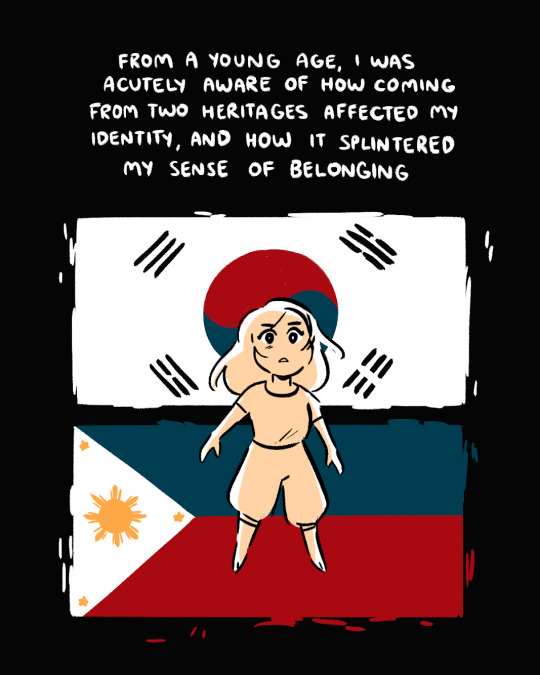
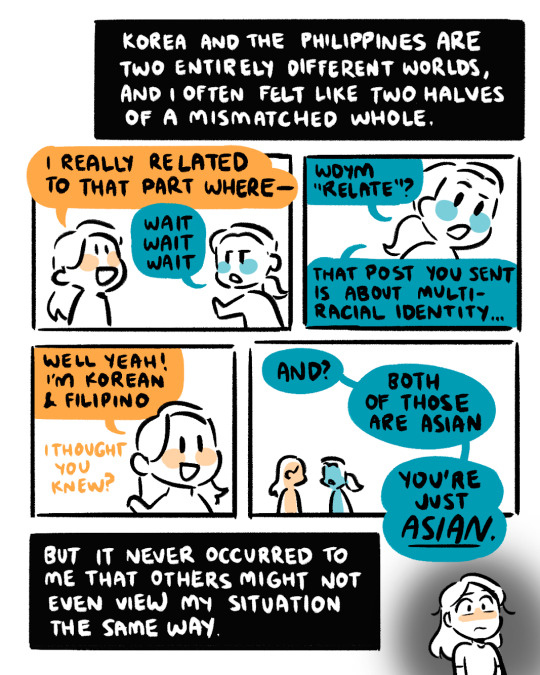
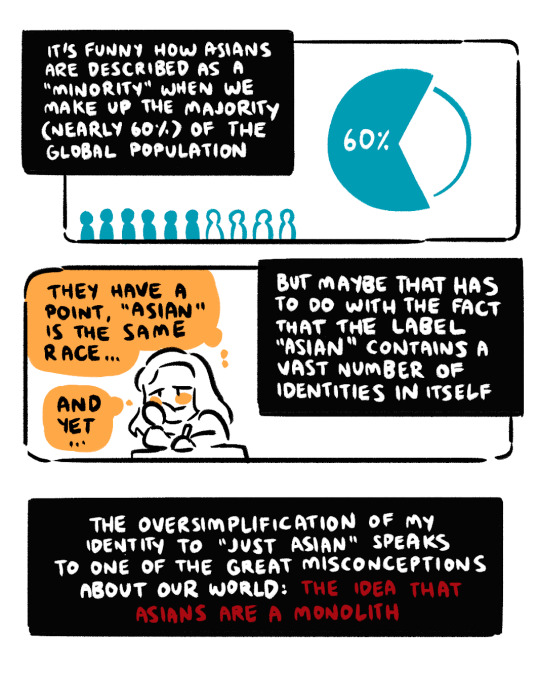
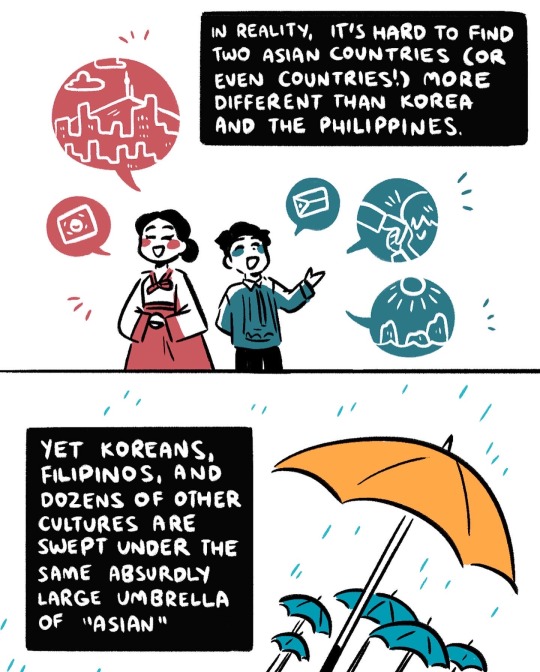
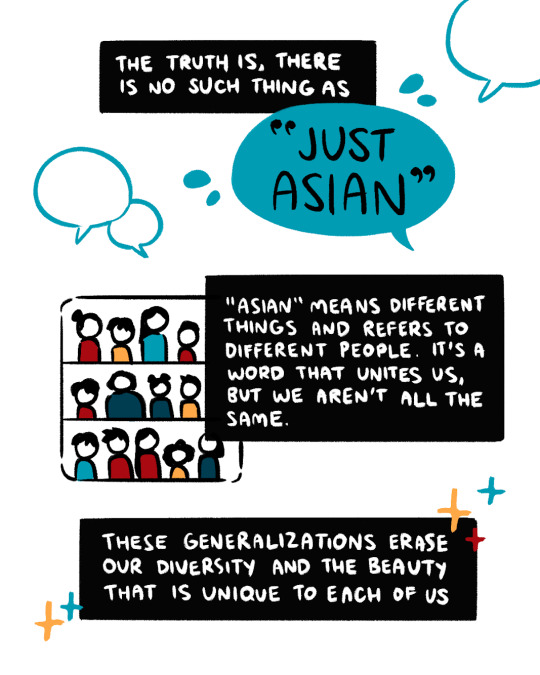
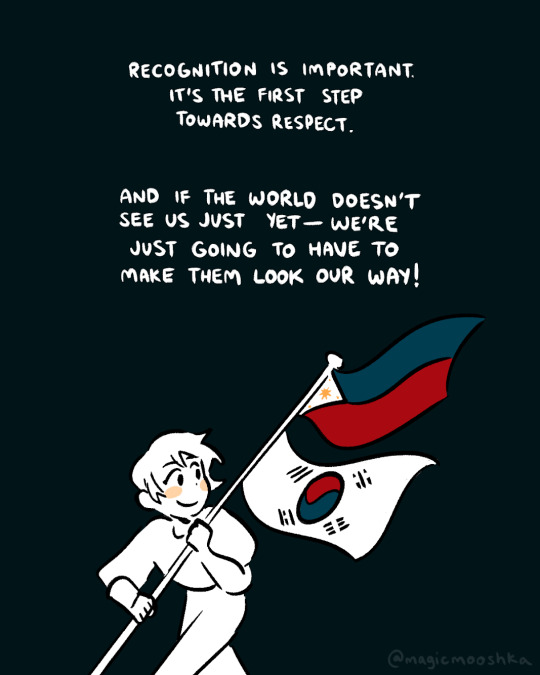
monolith: a comic for aapi heritage month 2022
43K notes
·
View notes
Text
[008] dancing with myself
japanese uses katakana for loanwords. for historical reasons, the older the loan, the lower the possibily that it comes from english. think dutch traders, portuguese missionaries and prussian scholars. to your average japanese monolingual, this poses no issue whatsoever: they dont have to rely on the word's origin to decipher it. but to us gaijin, interpreting katakana at speed is a skill that has to be developed seperately from other reading competences, such as accumulating kanji. and then there are polyglot assholes like me: "can i have the language of origin please?"
usually medical words are german, artistic words are french, and food words are from where the cuisine originated, but sometimes there's nothing to go on. having to sound it out and cycle through all the possibilities is essentially a very agonising game of one-person-charades to me. sometimes i have several ideas of what it can be, but when i look it up it turns out to be none of them. my most recent encounter with brain-breaking gairaigo was アンケート. thankfully i figured it out when someone said 調査, but what english word that vaguely means questionnaire starts with A? nope! i was so wrong. it's supposed to be enquête. i wonder if it would have clicked right away if it was spelled オンケット instead.
and then there was that one time i went to a gelateria with an all-katakana menu. at least i knew i was looking at italian words for foods, but a lot of the flavours were similar colours, so to work out which was which without holding up the line, i had to do japanese-to-italian-to-flavour in my head at breakneck speed, which is about as close as i will ever get to ken jennings' initials-to-roman-numerals-to-numbers moment on jeopardy. thank god italian and japanese phonetics follow mostly the same rules, otherwise i would have just given up and gone to baskin robbins instead. but maybe there's no way to win, cause baskin robbins is called サーティワンアイスクリーム in japan, which is pronounced (you guessed it!) saatiwan aisukuriimu. 31 ice cream. what was wrong with バスキン ロビンス? did a board room full of pretentious snobs just assume that the average japanese person wouldnt be able to parse the name? sounds real patronizing to me. oh well, looks like i'll just be dancing with myself then, on the floors of tokyo.
2 notes
·
View notes
Text
[007] pourquoi faire simple quand on peut faire compliqué?
il était une fois, je suis allé à paris. mea culpa, je sais. la ville était moins sale que je ne le pensais, et la bouffe n'était pas dégueulasse, mais un petit incident agaçant s'est présenté au supermarché. je m'en souviens toujours: le montant était 14,39, donc je lui ai donné 24,40 pour que je puisse me débarrasser de ma ferraille. la connasse caissière a fait un bruit râleur, puis elle m'a rendu les pièces en disant "itz too meuch". j'ai insisté. "nononon, me faut un billet de 10 et 1 centime." mais c'est pas sorcier ça! elle a mis du temps à comprendre ce que je lui ai dit en comptant les pièces, mais elle a quand même dû consulter une calculatrice, que dieu l'aide! après son épreuve longue et ardue, elle m'a enfin donné ma monnaie. je n'ai jamais eu de problèmes comme celui ci en asie, que ce soit aux grandes villes ou à la campagne.
le stéréotype des asiatiques doués en maths est partiellement vrai, mais souvent poussé à l'extrême, jusqu'à notre déshumanisation violente. par contre, j'ai une hypothèse sur la france: elle n'a pas pu construire une numératie culturelle à cause de ses chiffres chiantes et illogiques. pourquoi disons nous dix-sept, dix-huit et dix-neuf mais 11–16 ne suivent pas cette structure? et pourquoi la france préfère l'acrobatie mentale de 60+10 et 4*20+10 alors que septante et nonante existent en suisse et en belgique? toute cette confusion qui peut se produire au début de la scolarité risque de provoquer une aversion vers les maths, et le produit de ce bordel est un peuple qui paye seulement en cb. ou peut-être je raconte n'importe quoi.
en tous cas le chinois et le japonais ne souffrent pas de ce genre d'absurdité: on dit dix-un, dix-deux,,, deux dizaines, trois dizaines,,, sept dizaines, huit dizaines, neuf dizaines,,, tout est cohérent! quand faisons-nous compliqué alors? on a inventé un caractère pour chaque mot, et dans la vie quotidienne il en faut environ 2000 au japon et 4000 en chine, un obstacle insurmontable selon certains étrangers. quel danger de mesurer les autres avec son propre mètre!
1 note
·
View note
Text
[006] thanks, but no, but thanks!
speaking both french and japanese means that more often than not i am caught between two polar opposites.
according to my mother, when someone gives you a compliment, the polite response is to refuse it, because accepting it comes off as arrogant. (think regina george and her "so you agree, you think youre really pretty" spiel.) that backfired real quickly in front of non-asians. when i first started learning french, my teacher offhandedly said to me, "tu dessines bien, toi!" to which i responded "je ne suis pas d'accord" with a big smile on my face. the poor woman, she was so shocked. "mais astro, on ne dit pas ça, il faut dire merci!" i was very happy to have something to be humble about, but not many westerners seem to understand that, even when i spell it out to them. i think it might be because self confidence is such a prized quality in the west, it tends to overshadow everything else.
and then there's japan. somehow the only situation where saying thank you is wrong is when receiving a compliment. on top of that, most compliments that the japanese give are usually extremely backhanded but will be played as sincere to disguise whatever negative sentiments they may have. i once went to a 24-hour karaoke with friends i didnt know very well at the time, the cheap chain kind where we could get drunk without breaking the bank. one of them took a bite of their food and without any prompting, announced that their plate looked and smelled great, implying that it tasted like shit. if she had meant what she said, she would have told us before she started eating. some japanese people steer clear of me because i almost always mean exactly what i say, and that terrifies them. on the other hand, ive met plenty of people who find my candor refreshing.
i was bullied for all sorts of things at school, by mean popular girls who disguised all of their insults as compliments, including but not limited to: "your calves are enormous, where did you get those?" "you know so much, it's like you're autistic or something" "wow, you fit through the door!" and when i was visibly sick, "you've lost so much weight thanks to your aids infection!" i now have a hard time working out whether someone means well or not because ive gotten so used to being in defense mode all the time.
things are looking up for me though. cant believe im now surrounded by people who actually like me. it takes getting used to. maybe one day i can accept their love without having to think twice, but until then, my life will still be a delicate balancing act between "thanks" and "no", and im ok with that.
2 notes
·
View notes
Text
[005] c'est mantou blanc et blanc mantou
(reprise de 004, modifié pour public français)
(註:同004有重覆,不過唔係直譯)
désolé de vous donner faim, mais j'ai encore des choses à dire sur la bouffe!
le climat de la chine du nord est adapté à la cultivation du blé (souvent froment, mais aussi du sarrasin). par conséquent, l'alimentation de la région consiste principalement des baos et des nouilles, et peu de riz. c'est pareil chez moi en tant que shanghainaise alors que j'habite au sud. ok, jusqu'ici tout va bien, mais voici l'embrouille: les shanghainais architraditionalistes me disent qu'en shanghainais il faut pas dire bao, parce que ce mot est un emprunt non sollicité, et qu'il faut dire mantou à la place, même que dans la reste du pays le mot mantou fait référence qu'aux baos blancs sans rien dedans. concrètement ça donne un tas des mots mignons que les sudistes trouvent drôles et bizarres: je dis mantou blanc, mantou aux légumes, mantou à la viande, mantou frit, et le célèbre xiaolongbao alors? bah je dis xiaolong mantou comme dit ma famille. il existe même les mantous des jambes qui ne sont malheureusement pas comestibles, parce que ça veut dire les genoux!
je me demande si cette histoire vous rappelle quelque chose, chers francophones. un débat sur le nom d'un mantou français, peut-être? pour que tout le monde soit également fâché, parfois je l'appelle la crotte sous la couette, car la viennoiserie ressemble à un caca roulé dans une couverture. la merde n'a jamais été si délicieuse!
1 note
·
View note
Text
[004] 不用分那麼細
上海人掛喺口邊有一句 “鄉下人到上海,上海話講不來”,用嚟嘲笑由外省嚟打工嘅土包子(即大鄉里)。土包子一詞嘅來源,睇怕同上海人最心愛嘅饅頭有關,因為老派嘅上海人認為“包”係外來語,無論��咩麵團袋住咩餡,一律都叫饅頭,不用分那麼細。其中最馳名中外嘅緊係小籠饅頭啦,再老派啲的人仲會叫佢做南翔饅頭添。(利申:鼎泰豐係台灣嘢,所以味道清淡,份量又細,絕對唔係難食,不過冇嚟正宗,我好少幫襯。)
坦白講,蘇浙滬一帶嘅屋企三日唔煲飯都好閒,因為街邊大把平靚正嘅饅頭:白饅頭,菜饅頭,肉饅頭,生煎饅頭...... 我都成日食,唔食得嘅仲有腳饅頭(指膝頭哥),笑死朕。反而銀絲卷係���京津一帶嚟的,我同佢唔係好熟。
上海同好多大城市一樣,外來人口一浪接一浪嚟落腳。佢地同本地人產生嘅摩擦,多數都同方言上嘅唔同有關,兩邊皆因自豪而唔會隨便讓步。東京人嘅耳仔總係頂唔順又走音又粗魯嘅関西弁,而巴黎人會叫朱古力饅頭(哈哈)做pain au chocolat,因為只有南法嘅牧羊阿鄉先會稱之為chocolatine。我兩老喺呢度出世,未返過鄉下,好唔容易先學得識上海話,所以佢兩個口廣東話都冇鄉音。至於我本人呢代咧,識聽鄉下話嘅人已經唔多,識講嘅故然更加少。我細個成日擔心自己會被標籤做阿燦,所以從來唔敢俾太多人知自己識講上海話,望返轉頭真係覺得自己傻。我識講上海話只不過係一個客觀嘅事實,同我有冇儀態根本就扯唔上關係不凸止,我堅持講上海話主要係為咗反對某啲嘢。(唔好迫我畫公仔畫出腸,唔該。)
最近有人發明咗個新詞,叫做港燦,除咗控訴出到外國先嚟做埋晒啲仆街嘢嘅陀衰家,亦都可以用嚟批評唔知道大陸起咗飛好耐,比起阿燦要落嚟嘅年代已經好大進步嘅人。繼安倍俾人做瓜之後,我老母又發明咗個詞,叫做㗎燦,用嚟鬧啲乜都大安旨意,唔識保護自己嘅日本人,日文叫平和ボケ(和平痴呆)。呢類笨柒車門又唔鎖,單車又唔推入屋,出咗事先嚟後悔,連大城市都好多呢啲人,因為佢地成日諗住只要報警就乜都解決到。講到尾,大家都係阿燦,無論咩餡嘅係咁話,不用分那麼細。
1 note
·
View note
Text
[003] farandole du jour
parfois j'oublie qu'il est assez rare que quelqu'un comme moi parle français dans mon petit coin du monde, alors qu'environ 20000 français demeurent dans ma ville. il y a peu, j'étais à la bibliothèque avec des potes, dont l'un est français. je lui ai dit, "on va manger du 打冷 plus tard, tu viens?" mes potes non-francophones étaient pliés de rire, mais moi? au début j'ai pas trop compris pourquoi ils rigolaient, mais je me suis rendu compte plus tard qu'ils n'avaient jamais entendu une phrase frantonaise dans leurs vies. par contre, le frantonais fait partie de ma parole depuis très longtemps, surtout maintenant puisque je connais quelques hongkongais qui bossent pour des boîtes françaises, mais aussi des français qui ont épousé des hongkongaises. en tous cas la communication locale a toujours été très éclectique, et je l'avais jamais remis en question. ce que je n'avais pas réalisé avant, c'est que la farandole linguistique d'un habitant moyen n'a qu'un seul goût constant: du cantonais assaisonné avec de l'anglais, et rien d'autre.
le 打冷 est une espèce de casse-croûte/apéro mijoté de chaozhou qui est composé du poisson, de l'oie, du canard, du tofu, de la méduse, de la margate... les possibilités sont infinies, et j'en commande rarement la même combinaison pour ma farandole. malheureusement, je pense que je ne peux parler que pour moi-même, ou peut-être l'opportunité d'essayer différentes choses à chaque fois est une énorme privilège dont je devrais être plus reconnaissant.
1 note
·
View note
Text
[002] 第三類接觸
有好多人問我,“點解你對自己啲中文咁冇信心嘅?成日都開口埋口都話自己中文唔好,明明你喺屋企主力都係講中文架喎......”
我學中文嘅過程可以話由頭到尾都充滿挫敗感。
我老母教我寫嘅,好多都係日本漢字,而本地教育制度唔容許呢種唔繁唔簡嘅鬼畫符,只要喺功課裡面出現就會俾老師圈起話錯,有時仲會喺側邊寫多句“這是異體”。當時一年班嘅我問阿媽咩叫異體,佢話係外星人,我真係諗極都唔明。有乜理由我喺日本見過,屋企人會用嘅字會俾生保人批評話係火星文?真係又傷心又嬲。
我老母聽到我咁問之後,擔心有同學笑我係外星人,所以租咗套“第三類接觸”俾我睇,當係安慰我。喺戲裡面,科學家用音樂同外星人溝通,令我明白音樂都係一種語言,激發我投奔音樂嘅懷抱。多謝媽媽。
天真嘅我未知咩叫觀光,以為啲同學話去過日本就代表佢地屋企都有日本人,讀咗大半年一年班先慢慢意識到自己嘅成長同人地有幾唔同。其他人最多只能夠同我近距離接觸,唔會同我產生任何共鳴,所以我學識咗唔再嘥口水解釋自己嘅背景,自己嘅經歷,自己嘅睇法。
“唔係喎,你睇好多書架喎~” 大佬,啲中文故仔一日到黑都暗示男仔要點,女仔要點,我呢啲不男不女嘅外星人根本就一啲代入感都冇,緊係淨係睇英文書啦。我咁多年嚟嘅作文,好多都係將我喺日本嘅所見所聞結合我老母/我阿婆同我講嘅事,格硬真事假寫扮虛構,再唔係就攞英文故仔照譯。呢啲招時work時唔work,因為好多中文老師都唔buy天馬行空風格,反而英文老師就好鍾意。中文老師要嘅係虛偽版事實,即係情節要完全符合佢地嘅世界觀,結構跟足官方大綱,篇文塞滿四字成語修辭手法就為之very good啦。
教我嘅中文老師無論學校嘅又好,補習嘅又好,都唔識幫我,而只有幾個有盡力嘗試,大部分都係齋彈唔讚,基本上從來都冇人指點,冇人鼓勵。都算啦,最多咪自己揣摩。但係唔好唔記得,中文堂教嘅,乜都要背,唔會俾你有多餘RAM嚟擺自己鍾意嘅中文。
我離開中學之後,終於有時間去搵屬於我嘅中文。而我搵到嘅,唔係廣東話,唔係上海話,而係兩溝嘅第三類,十足我尾企人果口中文,夠晒親切,親切到要用嚟寫書。我唔係華人,唔係日本人,係第三類。我唔係男,唔係女,係第三類。呢個地球絕對有空間俾我生存。
2 notes
·
View notes
Text
[001] honorifics: 3-tiered system mentality
for the unitiated, japanese has 3 categories of 敬語 (keigo, honorific speech), used to imply or reinforce social relationships between the speaker and the listener.
丁寧語 (teineigo, polite speech): regular written language
謙譲語 (kenjyogo, humble speech): used when referring to oneself, as a courtesy to the listener
尊敬語 (sonkeigo, respectful speech): directed at those who deserve/command respect
the thing is, i recently caught myself applying this system to my french.
example 1: nouns
丁: ta femme
謙: ma meuf
尊: votre épouse
example 2: verbs
丁: tu manges
謙: je bouffe
尊: vous dégustez
i do this so often these days it scares me. do other japanese francophones think like this? i cant possibly be alone... i find this all to be mildly suffocating, but downright hilarious. either way there's this voice in my head that screams "FAUT ABSOLUMENT QUE TU SOIS HUMBLE TOUT LE TEMPS SINON TES POTES VONT TE TROUVER CHIANT ET MAL ÉLEVÉ"
0 notes
Text
<hello world>
hi, im astro! this is a storage space for my throwaway thoughts on language, culture, and their many facets. if you were expecting a langblr with learning resource masterlists and pretty pictures of handwritten notes, im sorry to disappoint you, but I'm sure there are plenty of other things we can explore together. feel free to write me an ask :)
FAQ
mother tongues: 粵 滬 JP
fluent in: 普 EN FR
casually learning: IT DE SV
can understand but can't speak: 閩 ES PT NL
writes in: EN FR 繁 JP (order of preference)
[flags are not languages!]
0 notes